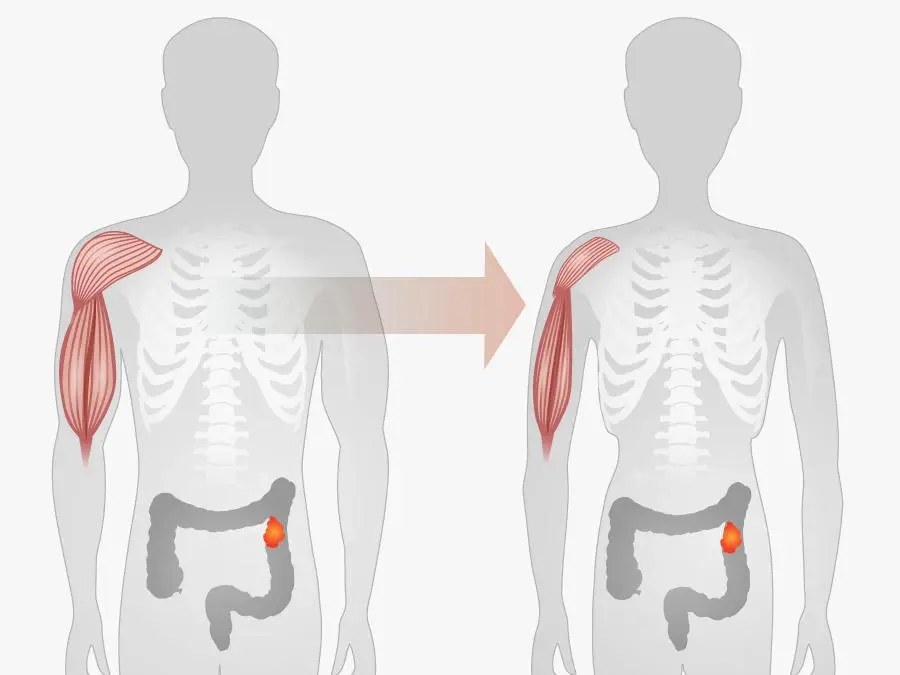
PROMO!
First order? Get 10% OFF with this code: 1storder
Written by

Myostatin supplements are research peptides created to help control myostatin. Myostatin is a protein that can slow muscle growth in research studies.
Researchers use these peptides in research to learn how lowering myostatin could help increase muscle size or strength.
At Peptide Works, we supply myostatin-related peptides for research purposes only, and we ship worldwide for research teams. All peptides described in this article are for research purposes only and not for human use.
Knowing what myostatin does in the body helps explain why these supplements are important for muscle research.
Explore Follistatin 344 from Peptide Works, a myostatin-binding peptide studied for promoting muscle growth and reducing muscle degradation.

Myostatin is a protein that limits muscle growth in research. It stops muscle cells from growing bigger or multiplying. Researchers find that blocking myostatin helps muscles grow larger and stronger.
This process, called muscle hypertrophy, involves more muscle fibers and increased protein building. Muscle satellite cells, which repair muscles, also become more active when myostatin is reduced.
Peptides such as Follistatin 344, which bind and inhibit GDF‑8 (myostatin) along with related proteins, are used in research to study these effects. This makes myostatin a key target for understanding muscle growth control. Understanding muscle hypertrophy shows how supplements work.
Explore GDF-8 peptide from Peptide Works, peptides studied for blocking myostatin to support muscle growth and reduce muscle wasting.
Muscle hypertrophy means muscle fibers grow larger and stronger through protein building. Myostatin is a protein that slows this growth by blocking muscle fiber increase and protein synthesis.
Myostatin supplements are research peptides that block myostatin, helping muscle fibers grow faster in studies. Scientists use these supplements to better understand muscle growth and muscle loss prevention.
This research is important for developing ways to improve muscle strength and fighting muscle wasting conditions. Peptide Works supplies myostatin supplements for research worldwide.
Preventing muscle loss is important, especially for individuals with muscle wasting conditions.

Myostatin is a protein that contributes to muscle atrophy by slowing growth and increasing protein breakdown. Other factors, like inflammation and disease-related stress, also play key roles.
Researchers study myostatin supplements to see if they can slow or prevent muscle wasting in research settings. Animal studies using peptides like this compound (Follistatin 344) show consistent gains in muscle mass and sometimes improvements in strength.
Human trials show muscle size increases more reliably than strength or endurance. This helps researchers understand how myostatin supplements might prevent muscle loss, protect skeletal muscle, and support muscle health in different wasting conditions.
Knowing what muscle atrophy is explains why this research matters.
Muscle atrophy means muscle fibers shrink and muscle mass is lost, leading to weakness over time. Myostatin is a protein in the body that signals muscles to stop growing and start breaking down, especially during inactivity, disease, or aging.
When myostatin levels are high, muscle atrophy speeds up as protein synthesis slows and muscle fibers degrade.
Researchers use peptides like Follistatin 344 in studies to block myostatin. Blocking myostatin may help slow or prevent muscle loss, which is important in muscle wasting research. Myostatin supplements are also studied for muscle loss beyond athletics.
Myostatin supplements are researched not just for muscle building in athletes but for helping prevent muscle wasting in medical conditions.
Researchers study these peptides for diseases like muscular dystrophy, sarcopenia (age-related muscle wasting), and cancer cachexia.
High myostatin levels speed up muscle breakdown in these illnesses, causing sharp muscle mass declines. Blocking myostatin may help reduce muscle loss and support strength.
However, consistent strength improvements have been more limited in human trials. This research offers hope for new ways to support muscle health in people with chronic illnesses and severe muscle wasting.
Cancer cachexia is a severe muscle-wasting condition where myostatin supplements are now closely studied.

Cancer cachexia causes fast muscle breakdown in individuals with cancer. Myostatin is one of the proteins that can make this worse.
It blocks muscle growth and speeds up muscle breakdown, especially during illness or stress. In research, peptides like this compound (Follistatin 344) block myostatin.
This may help slow muscle wasting in cancer. Researchers are still studying this to find better ways to protect muscle in cancer patients. These studies highlight the potential for future therapies aimed at preserving muscle in cancer patients.
Research on myostatin blockers peptide is growing fast, showing promise in muscle health.
Myostatin supplements show great promise for research in muscle growth and loss prevention. Researchers study how peptides like Follistatin 344 can help fight muscle wasting from illnesses like cancer and aging.
While still for research only, future discoveries may turn myostatin blockers into treatments that protect muscles and improve quality of life.
As studies continue, myostatin supplements could become key in muscle health and recovery therapies worldwide. This makes the future of myostatin research hopeful and exciting.
All products discussed are supplied for research purposes only and are not intended for human use.
[1] Kota J, Handy CR, Haidet AM, Montgomery CL, et al. Follistatin gene delivery enhances muscle growth and strength in nonhuman primates. Sci Transl Med. 2009 Nov 11;1(6):6ra15.
[2] Rodino-Klapac LR, Haidet AM, Kota J, Handy C, et al. Inhibition of myostatin with emphasis on follistatin as a therapy for muscle disease. Muscle Nerve. 2009 Mar;39(3):283-96.
[3] Al-Zaidy SA, Sahenk Z, Rodino-Klapac LR, Kaspar B, Mendell JR. Follistatin Gene Therapy Improves Ambulation in Becker Muscular Dystrophy. J Neuromuscul Dis. 2015 Sep 2;2(3):185-192.
[4] Hamrick MW, Arounleut P, Kellum E, Cain M,et al. Recombinant myostatin (GDF-8) propeptide enhances the repair and regeneration of both muscle and bone in a model of deep penetrant musculoskeletal injury. J Trauma. 2010 Sep;69(3):579-83.
[5] Rodgers BD, Ward CW. Myostatin/Activin Receptor Ligands in Muscle and the Development Status of Attenuating Drugs. Endocr Rev. 2022 Mar 9;43(2):329-365.
ALL CONTENT AND PRODUCT INFORMATION AVAILABLE ON THIS WEBSITE IS FOR EDUCATIONAL PURPOSES ONLY.
DISCLAIMER: These products are intended solely as a research chemical only. This classification allows for their use only for research development and laboratory studies. The information available on our Peptide Works website: https://peptide-works.com/ is provided for educational purposes only. These products are not for human or animal use or consumption in any manner. Handling of these products should be limited to suitably qualified professionals. They are not to be classified as a drug, food, cosmetic, or medicinal product and must not be mislabelled or used as such.
Peptide Works
Related Articles

Best Peptides for Women in Perimenopause: From Libido to Energy
Do you feel drained, struggle with focus, or notice your drive slipping during perimenopause? These common symptoms can feel frustrating.

What Is The Best Myostatin Inhibitor For Muscle Growth?
Finding the best myostatin inhibitor involves examining compounds that block muscle growth limits in lab studies. The crucial role of

Regulating Blood Sugar Levels with Mots-C
Maintaining steady glucose supports sharp focus, constant energy, and leaner body-composition outcomes in laboratory settings. Among the emerging tools for